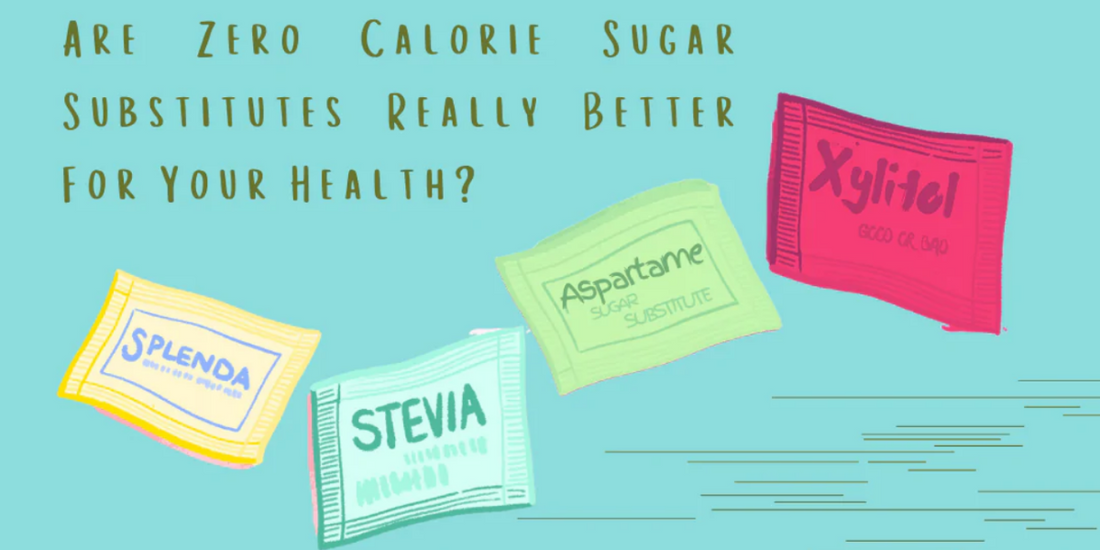
Are Zero Calorie Sugar Substitutes Really Better For Your Health?
Share
Are Zero Calorie Sugar Substitutes Really Better For Your Health?
White processed sugar can cause a myriad of health problems including diabetes, heart disease, cancer, and—most notably—obesity. For the first time in history, people are wisely taking preventative measures to improve their health by avoiding sugar or finding healthy sugar substitutes. However, choosing a healthy sugar substitute to white processed sugar can be a grueling task. Let’s explore the alternatives together.

Traditionally, people have chosen ‘healthy’ sugar substitutes based solely on whether a sugar substitute is zero calorie. What they don’t know is that many of these zero-calorie sugars can have serious adverse health effects, making them dangerous options.
All zero calorie sugar substitutes can be painted with the same brush. These are most notably known as aspartame (Equal), Stevia (Truvia), Saccharin (Sweet n Low), Sucralose (Splenda), Xylitol (found in candies), and Erythritol. Some are sugar alcohols such as xylitol and erythritol while others are artificial sweeteners like aspartame and saccharin. Still others claim to be natural such as stevia but are in actuality highly processed.

While reducing sugar in your diet can be seen as a healthy choice, often the substitutes are more harmful than helpful. While these sugar substitutes are void of calories, this absence doesn’t come without a bitter cost.
Most zero-calorie sugar substitutes such as aspartame and saccharin are chemical compounds and not actually food, so they have absolutely no nutritional value and can even harm your health. In studies done on animals, aspartame is linked with cancer in high doses. Be leery of most of these sugar substitutes and please, please, please don’t even think about feeding them to your children!

Why Are Super Sweeteners Dangerous?
Some of these super sweeteners can be exponentially sweeter than regular sugar. For example, Stevia is 350x sweeter. While at first this may appear to be a positive characteristic, it can have a devastating outcome. Artificial sugar substitutes can potentially cause you to gain weight over the long term and create health conditions such as diabetes. How does this happen?
When you consume the zero-calorie sweetener, your brain tricks your body into thinking calories are on the way. The pancreas begins to release insulin, and when the calories don’t show up, it can lead to insulin resistance over time, causing diabetes and weight gain. These high-intensity sugar substitutes can increase your sugar cravings and leave you less satisfied. Because they are zero calories, they are not filling and will leave you hungry and more unsatisfied than actual sugar substitutes that are made up of whole foods.

Stevia is Not Natural
If you ask google “What is the healthiest sugar substitute?” it will name Stevia. This is alarming, because even though it does originate from the stevia Rebaudiana plant from South America, it is highly processed into a powder with ethanol in a lab—removing any nutritional properties it once contained. Its more original forms were not approved by the FDA. Therefore, what you buy off the shelf is far from natural and most definitely not nutritious!
Aspartame, a Hazardous Chemical
It is scary that Aspartame is one of the world’s most-used artificial sugar substitutes. It is used to sweeten diet soft drinks and branded as Equal. It is synthetically manufactured using chemicals. It has as many calories per gram as white sugar, but 200x sweeter so you don’t have to use as much. This, along with the fact that it has no glycemic index, many people choose this option to lose weight. Even though it contains calories, it is classified as a zero-calorie sugar substitute because such a small amount is required to sweeten a substance.
Aspartame has been known to cause serious health problems such as cardiovascular disease, cancer, mood disorders and migraines—just to name a few. It has been known to affect the immune system, leading to inflammation and stress. Aspartame is just plain bad and if you see this ingredient in anything, run away as fast as you can!
Is Xylitol Safe?
Xylitol is a sugar alcohol found in fruits and vegetables, but is highly processed and manufactured using chemical methods. Because it is an alcohol like Erythritol, it is harsh on the digestive system and can cause gas and bloating. Again, not the best option.
Saccharin, The Oldest Artificial Sweetener
Saccharin has been around for 100 years and is used as a. table sweetener as well as in many diet beverages and food. It is an artificial sweetener made in a laboratory by oxidizing chemicals. Saccharin is 300-400 times sweeter than white sugar and has a bitter aftertaste so it is often mixed with other low calorie sweeteners that don't. Therefore, be sure to check the label because saccharin could very well be mixed in with a more natural sweetener to make it a lower calorie option. Like other zero calorie sweeteners, it is void of nutrition and has the potential to increase your appetite for sweets.
Erythritol, a Better Zero-Calorie Option
Erythritol may be the better option when searching for a zero-calorie sugar substitute. Erythritol’s natural source is found in fruits, but the sugar you buy on the shelf is made by fermenting the glucose in cornstarch that comes from non-GMO corn. Because it doesn’t metabolize, it doesn’t convert to energy for your body. Like xylitol, erythritol is a sugar alcohol that can cause digestive issues and upset the stomach.
While Erythritol is a better option than artificial sweeteners because it comes from a natural source, it is still processed and void of nutrition
Swerve — What’s all the commotion?
Even though Swerve is made up of other sugars, we will give it its own category here, because it is such a popular sugar substitute at the moment. While Swerve is made from natural ingredients such as erythritol, oligosaccharides, and natural flavors, it is still highly processed. But Swerve is, again, going to be a better option than aspartame and xylitol if you are looking for a low calorie, non-glycemic sweetener. And of course, like the others, Swerve contains no nutritional value.
Monk Fruit, More Natural but Void of Nutrition
If you are adamant about using a zero-calorie sugar even after you are aware that none of them contain any nutrition and are all highly processed, monk fruit is probably your best option. Monk fruit is more natural than other zero-calorie sugar substitutes. It comes from a natural source and is minimally processed, since it is simply crushed to release the sweet juices, then infused with hot water and filtered. Unfortunately, monk fruit is still void of any nutritional content and contains a high intensity amount of sweetness, similar to artificial sweeteners, increasing your overall appetite for sweets.

Don’t be Scared of Calories
We all need calories, and consuming too few good calories or consuming empty calories can leave a person feeling hungry and without energy. This can actually cause a person to overeat, because they aren’t getting full from the calories they are consuming. It’s not about how many calories, but the quality of calories we consume.
It is best to make sure the calories you are putting into your body are loaded with nutrition. In order that a food retain its nutrition, it must be minimally processed and come from a whole food. When it comes to sugar, it’s best to choose a sugar substitute that comes from a whole food and contains large amounts of fiber so that you are getting the maximum amount of nutrition and the fiber helps you feel fuller longer. A good option is PurDate sugar because date sugar is loaded in fiber!
Are you Diabetic?
If you are diabetic and choosing artificial sweeteners because you are concerned about the glycemic index of sugars that are not zero calorie, there are reasonable options to choose from—such as date sugar and date syrup. Both have a low glycemic index and are nutritious, but date sugar has more fiber. Refer to the chart above for a full list of sugar substitutes to aid you in making a healthier decision next time you visit the local grocer.
The Solution to your Sugar Troubles
Don't be intimidated by the variety of choices when it comes to sugar substitutes. You have already taken positive steps in the right direction because you are now more informed than you were before! Stay tuned for more articles to come that will help you navigate the journey toward better health together and remember-It is healthiest to choose an all-natural, nutritious sugar substitute such as date-sugar. At Purdate, we are passionate about nutrition and helping you have access to some of the world's healthiest sugar. Try it out by sprinkling it on your oatmeal, fruit, or yogurt parfait! You can even check out our recipes and start baking!

